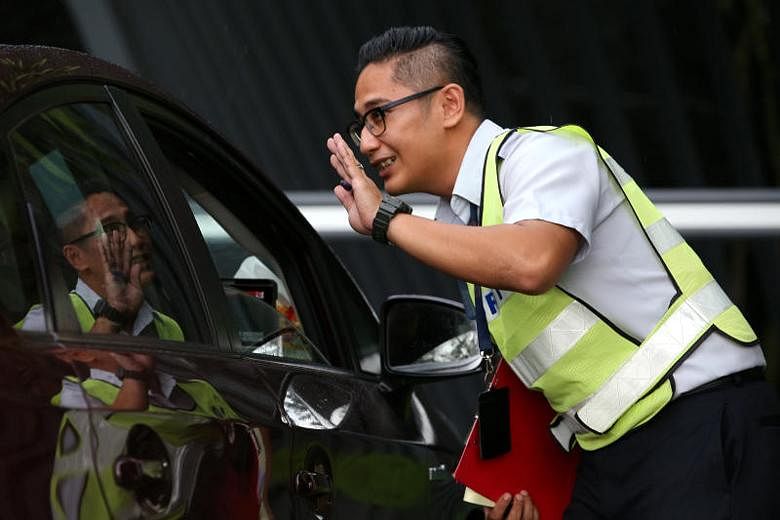SINGAPORE - Mr Mohamed Alfie Idris, 38, had to get used to much longer hours when he began working as a senior security officer two years ago.
In his previous job as a cafe supervisor, he clocked eight-hour shifts and had the weekend off. Now, he works 12-hour shifts, six days a week.
"I only get to spend quality time with my wife on my days off," he said.
But he should be able to spend more time at home four years from now, when restrictions on overtime hours in the security industry take effect.
From 2021, security companies can no longer apply for exemptions to allow guards to work up to 95 hours of overtime a month, above the legal maximum of 72 hours.
"If the hours are not so long, we can also be more productive at work. Security jobs need us to be alert all the time," said Mr Alfie, who works at a condominium in Petir Road.
Other security guards also welcomed the move to reduce their working hours, which was announced on Thursday (Nov 23).
In other changes, the minimum pay for security guards will also be raised from 2019 under the progressive wage model.
Security companies say that the wage increases and cut in overtime hours for security guards will drive up costs.
Mr Pierce Ang, the deputy managing director of Pico Guards, which employs around 600 security officers, said the costs of hiring a security guard will likely go up by about 10 per cent for building and facilities managers who contract their services.
"The impact will probably go back to the buyer," he said, adding that security companies will have to adopt technology to reduce their reliance on manpower - a move that could even bring net costs down.
One technological solution is the use of video analytics, where closed-circuit television cameras can detect abnormalities such as illegal parking, smoking or intrusions.
A job that requires 12 man-hours can be reduced to just one hour in this manner, he told The Straits Times.
"But some buyers may have reservations and feel that having actual eyes and men on the ground to intervene in an emergency situation is better," he added.
When asked, an MOM spokesman said exceptions to the overtime rule may still be made for major events requiring heavy security.
A spokesman from Certis Cisco, which employs more than 5,000 security guards, said security service buyers will have to work closely with agencies to find a combination of technology and boots on the ground that works for them.
Security Tripartite Cluster chairman Zainal Sapari said at a media briefing on Thursday that his group is working with the Ministry of Manpower to help buyers source for technology providers.
There are grants available to support this, he added.
Noting that about seven in 10 security officers work at condominiums, he said the STC is in talks with condominium management offices on using technology services that can be shared.
Customers such as commercial building managers and condominium management council members said they were worried about the rising costs.
CapitaLand Singapore property services head Alfred Lim said security makes up a significant proportion - about 10 per cent to 20 per cent - of operating expenses.
To try and keep costs down, he is looking at sharing security services across several of his company's buildings if they are located near each other - a practice already being done for internal technicians.
"With technology and better trained officers, we hope to reduce the manpower cost to negate the salary increase," he said.
But Mr S. K. Cheah, a Management Corporation Strata Title council member at several estates, said he does not know of technology that can solve some of the challenges at condominiums, which are more open than commercial buildings.
"There may be certain problem spots that guards know to patrol, and they can recognise strangers with trolley bags who may be doing short-term rentals when they should not be," he said.
If more guards are needed due to the shorter working hours, residents may have to pay more in maintenance fees eventually, he added.
Complex manager Jennifer Ang, who oversees a mixed-use property in Shenton Way, hopes the overtime reduction, coupled with the higher pay, will encourage guards to stay on in the industry.
"We prefer familiar faces as residents feel more comfortable with them," she said.
Better working conditions will hopefully attract more young people, said security supervisor Peter Lim, 62, citing how tech solutions could remove the need for regular patrols.
"If we use more cameras, I don't have to climb up and down the stairs so many times every day," said Mr Lim, who works at a commercial building in Middle Road. "But some of my older colleagues may complain about using technology because they're not used to it."

